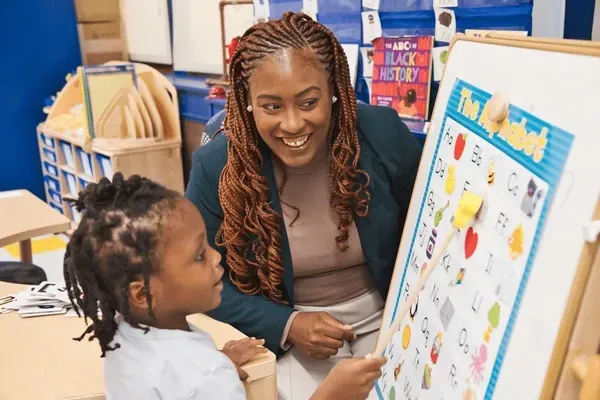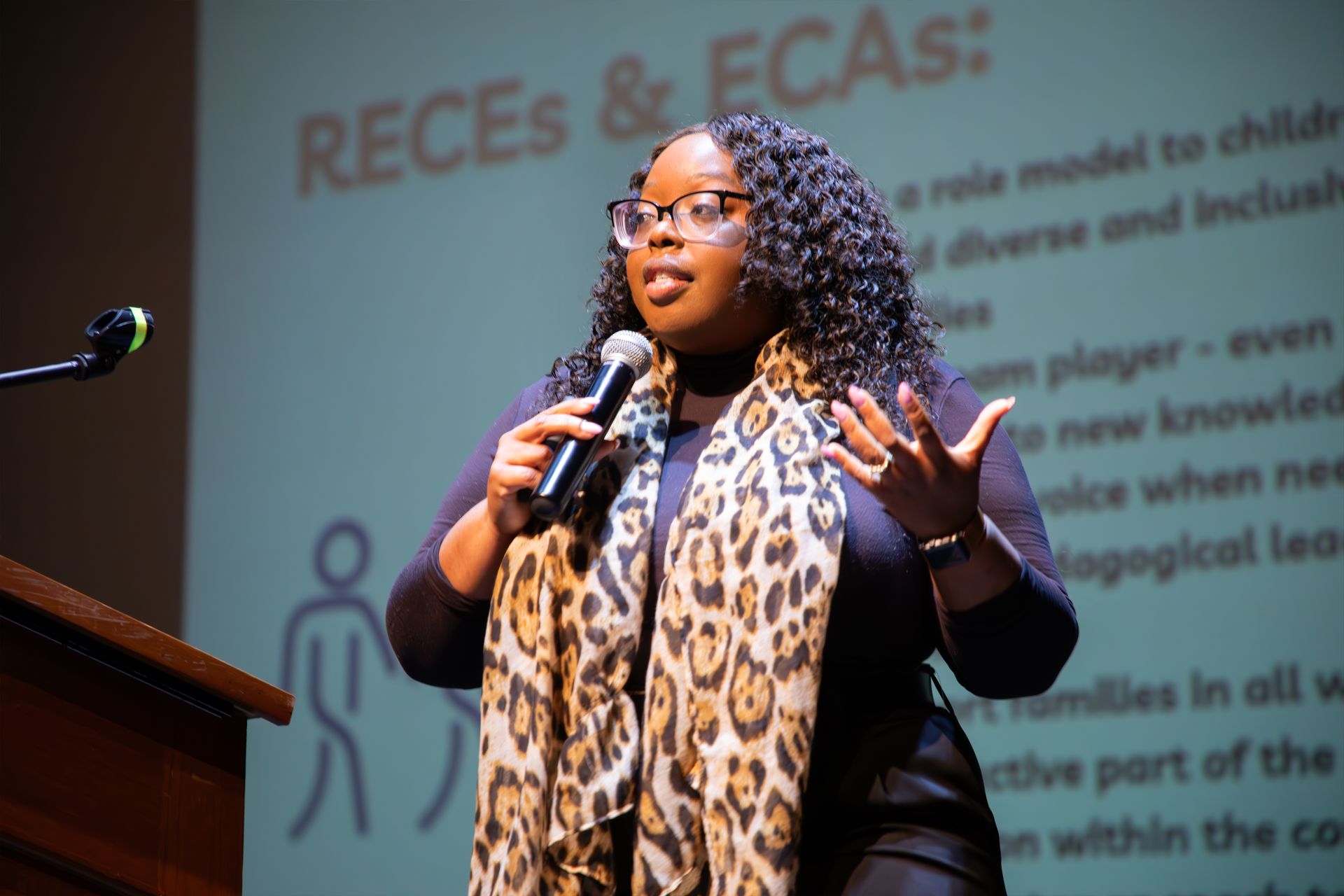Empowered ECE Leaders Equals Lasting Success: ECE Leadership Insights in 2024
Anisha Grossett • April 1, 2024
At The Early Childhood Coach, we know strong leaders have a significant impact on a childcare program’s success. This year, we made it our top priority to gain insight into their daily challenges and provide realistic strategies for success. We started by surveying ECE leaders and educators to understand the current state of ECE leadership in 2024. Below, we discuss these findings, and Anisha shares the exciting solutions she and The ECC created to empower and support leaders and ECE communities.
Tell us about your leadership research and how it informed your latest offerings through The ECC.
We surveyed 36 leaders or aspiring leaders to dive into the distinctive viewpoints, hurdles, and aspirations of individuals currently working in early childhood education (ECE). Their responses provided us with a roadmap for understanding the unique needs of ECE leadership. We used these responses to inform our future programming and develop a new leadership certification program that directly addresses the most common challenges leaders face.
We know leaders have plenty of options for leadership training. Unfortunately, most of these programs do not offer realistic strategies for day-to-day challenges. We created a custom program that tackles the hot topics on every leader’s mind: conflict resolution, burnout, communication, staff turnover, and team growth, to name a few.
The responses from our survey directly informed the topic choices for our program, so we know we’re teaching leaders exactly what they want and need to learn.
We equip leaders at all levels with the confidence and skills to tackle any challenge, transform your team, and build a brighter future for the children in your care.
>>Want to find out why leadership training is essential in 2024? Request a copy of our 2024 Leadership Insights Report
now.
Why did you decide to create a leadership certification program?
Most ECE leaders are not receiving practical leadership training. They are trained on day-to-day operations rather than everyday strategies like having difficult conversations, managing conflict, or navigating different personalities in the classroom. Our study found that 85% of ECE leaders felt unprepared for their leadership role.
Nearly every leader I meet shares the same experience- they feel like they’ve been thrown into their position with little or no support or training. I’ve spent many years in the ECE industry, and this was my experience as well. ECE leaders care deeply about supporting their team’s growth and creating positive environments in the classroom. Leaders want to serve their teams, but with no training and so many tasks, all too often, they lose their spark and get burnt out.
Our Early Childhood Leadership Certificate Program equips current and aspiring ECE leaders with the knowledge, skills, and confidence to transform their teams, manage conflict, and build a positive ECE culture that supports the growth and success of their childcare centre.
We also saw a need for developing a unique approach to leadership training depending on where they are in their training, whether a new or aspiring leader or experienced leader who needs an energy recharge. We built two training pathways to support all ECE leaders in their journey:
- The Leadership Launchpad is for new and aspiring ECE leaders who want expert guidance and education that helps them transition from classroom to leadership roles with confidence and realistic strategies for success.
- The Leadership Recharge is for ECE leaders at all levels who want to rediscover their purpose and passion or feel better equipped to handle daily challenges and find a better work-life balance.
>> Ready to level up your leadership skills and feel more confident in your role?
Join the next cohort today!
What do childcare owners and corporate leaders need to know about ECE leadership in 2024?
Business owners spend a lot of money on turnover and retraining staff. If they invested in building effective leaders instead, they would save money in the long run and support business growth. Parents and staff get tired of seeing a new person in the office so often. Owners must understand that it's about not just training leaders on daily activities and tasks but properly equipping them with the skills needed to create a well-rounded program.
Sturdy, effective leaders support their company's growth and boost their business's bottom line. Yet in our recent survey, 88% of respondents said they haven't participated in any leadership or management training programs!
Successful leaders keep enrollment up, retain and support reliable staff, and keep parents and kids happy. It's a win-win when businesses give leaders the resources and education they need to be successful.
Our ECE leadership certification program tackles the real-world challenges that ECE leaders face, providing education, support, and coaching through our team of ECE experts. We become a part of the team, taking the heavy lifting off owner’s shoulders so they can focus on growing the business.
>> We offer group discounts when you enroll multiple leaders! Book a
discovery call
to find out how.
Can you talk about your experience as an ECE leader?
I’ve had many different experiences across roles and companies; I spent more time in my 15 years in ECE as a leader than in the classroom. Like many ECE leaders, I felt thrown into my first leadership role and was not trained to lead a team!
I jumped into leadership at a younger age, so most of my staff were older than me. It was a big thing to address that aspect of proving myself and having them take me seriously. And, of course, issues like this are not discussed in any other leadership programs right now.
I had to learn on the job how to lead educators through problems, like mediating conflict between educators and parents. It’s crucial to make sure parents feel heard and validated while also protecting and supporting your staff. Managing all of that without training or a resource guide was tough!
In most of my roles, the only support I had was from owners or the board of directors. Most of them had never held ECE leadership roles and did not have the experience to help me navigate these difficult conversations and conflicts.
Unfortunately, not much has changed since then, and leaders still feel alone in managing their roles.
>>Learn more about Anisha and The ECC team here.
How did you transition from ECE leadership to becoming a coach?
I used to always think that if I just had a coach who could support me and I could ask questions without judgment, it would be so much better. You have your staff, but you must have boundaries, and there are certain conversations you can’t have with them. But then you often don’t have support from the top-level executives either, so who do you go to? I decided to be the coach that I wanted to have all those years. I see over and over again leaders searching for spaces where they can share struggles and find support that isn’t available in their workplace.
Because I’ve held many different leadership roles in ECE, I have a unique understanding and wealth of experience in all aspects and levels of leadership.
I can help leaders understand what they can change and what they need to let go of. It is so important to manage our own mental health and well-being as leaders. Our leadership survey found that only 14% of leaders had implemented strategies or knew how to manage work-life balance. I help leaders find better work-life balance while supporting their teams to prevent burnout. Both of our leadership tracks tackle these issues so leaders can look forward to lasting success in their personal and professional lives.
Why did you feel it was important to include live coaching sessions in leadership training?
We know leaders are busy but still need personalized support, so we created a custom program with a flexible mix of on-demand training and live coaching sessions. We offer two options for live training for your convenience:
- Virtual coaching: You can meet with me and a small group of peers from the comfort of your own home or office.
- In-person coaching: We book a beautiful space to get together or come to your location to meet directly with your team for a one-of-a-kind experience.
Each coaching session with me is specifically curated to the issues leaders face. They can ask questions and bring issues to the table so we can discuss as a group and problem-solve together. Life at the top can be lonely- I’m here to be your sounding board and safe space to talk through issues, answer questions, and help you recharge and embrace your leadership role.
This also allows leaders to connect with others at a similar stage in their careers. It is so meaningful to be able to talk to someone who understands where you’re coming from.
We want this program to become an extension of your leadership team, supporting the growth and success of your childcare centre by empowering leaders and transforming teams. Learn how we support leaders at every level by visiting
The ECC Leadership Certification Program.


Finding Joy and Purpose in the Middle of the Year Somewhere between the excitement of September and the promise of summer, there’s February — the quiet stretch in the middle. The new-year energy has faded, the routines feel repetitive, and many educators find themselves just trying to make it to the next long weekend. If you’ve been feeling that way lately, you’re not alone. This season can be one of the hardest in early childhood education — the weather’s cold, the classrooms are busy, and energy levels are low. But this moment also offers something powerful: an invitation to pause, reflect, and reignite your passion for why you started in this field in the first place.

Every January, we make promises. To eat better. To plan more. To do more. But this year, I want to invite you to make a different kind of promise — one that centers you. Because before you can nurture others, you must nurture yourself. And as early childhood educators, you are the heartbeat of the classroom. You are the tool, the connection, the comfort, and the calm that every child looks to. Your well-being, your energy, your spark — these are the most powerful instruments you bring into your work each day. So what if this was the year you decided to refill your own cup first?



